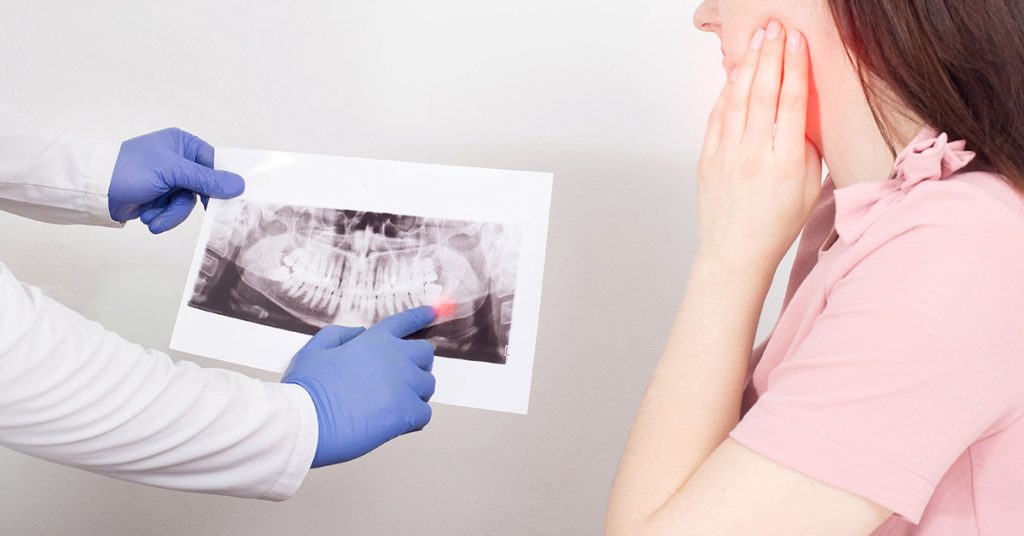Wisdom teeth, also known as third molars, are the last set of molars to develop in the human mouth. They typically appear between the ages of 17 and 25, although there can be some variation. The name “wisdom teeth” is thought to come from the fact that they emerge at a time when people are typically considered to be more mature or “wise.”
Anatomy of Wisdom Teeth
Wisdom teeth are located at the farthest end of the dental arches, right at the back of the mouth. You’ll find two on the top and two on the bottom. Like other molars, their primary function is to grind food. However, because of their late development and often awkward positioning, they may not contribute much to the chewing process.
Symptoms of Wisdom Teeth Problems
If your wisdom teeth are impacted or causing other problems, you may experience some of the following symptoms:
- Pain
- Swelling
- Difficulty opening your mouth
- An unpleasant taste
- Gum recession
- Tooth decay
- Infection
- Cysts
- Tumors
Causes of Wisdom Teeth Problems
There are a number of factors that can contribute to wisdom teeth problems, including:
- Not enough space: Wisdom teeth often have difficulty erupting because there is not enough space in the mouth for them to come in properly. This can cause them to become impacted, which can lead to pain, swelling, and other problems.
- Crowding: If your other teeth are crowded, there may not be enough room for your wisdom teeth to erupt without causing problems.
- Malposition: Wisdom teeth can sometimes grow in at an angle or in the wrong direction. This can also lead to problems, such as pain, infection, and damage to neighboring teeth.
- Genetics: Some people are more likely to have wisdom teeth problems than others, due to their genetics.
When to See a Dentist
If you are experiencing any of the symptoms of wisdom teeth problems, it is important to see a dentist as soon as possible. The dentist will be able to assess your oral health and determine if your wisdom teeth need to be removed.
Removal of Wisdom Teeth
If your wisdom teeth need to be removed, the procedure will usually be performed by an oral surgeon. The complexity of the surgery depends on the position and development of the teeth. You’ll receive local anesthesia, and in some cases sedation or general anesthesia, to ensure your comfort during the procedure. Post-operative care instructions will be provided to aid recovery and minimize complications.
Recovery from Wisdom Teeth Removal
The recovery time for wisdom teeth removal varies depending on the individual and the complexity of the procedure. However, most people are able to return to their normal activities within a few days.
Conclusion
Wisdom teeth are a natural part of human oral development but can occasionally cause issues. Regular dental check-ups are crucial in tracking their growth and dealing with potential complications early. If extraction becomes necessary, it’s a common and manageable procedure, with care and guidance provided every step of the way.
What are the risks of wisdom teeth removal?
The risks of wisdom teeth removal are relatively minor, but they can include bleeding, infection, and damage to neighboring teeth.
How do I prepare for wisdom teeth removal?
You will need to follow your dentist’s instructions carefully before and after your wisdom teeth are removed. This may include avoiding certain foods and activities, and taking pain medication as prescribed.
What are the alternatives to wisdom teeth removal?
In some cases, wisdom teeth can be monitored and left in place if they are not causing any problems. However, if wisdom teeth are causing problems, they will eventually need to be removed.
What are the benefits of wisdom teeth removal?
There are a number of benefits to wisdom teeth removal, including: * Reduced risk of pain and infection * Prevention of damage to neighboring teeth * Improved oral hygiene * Reduced risk of cysts and tumors



